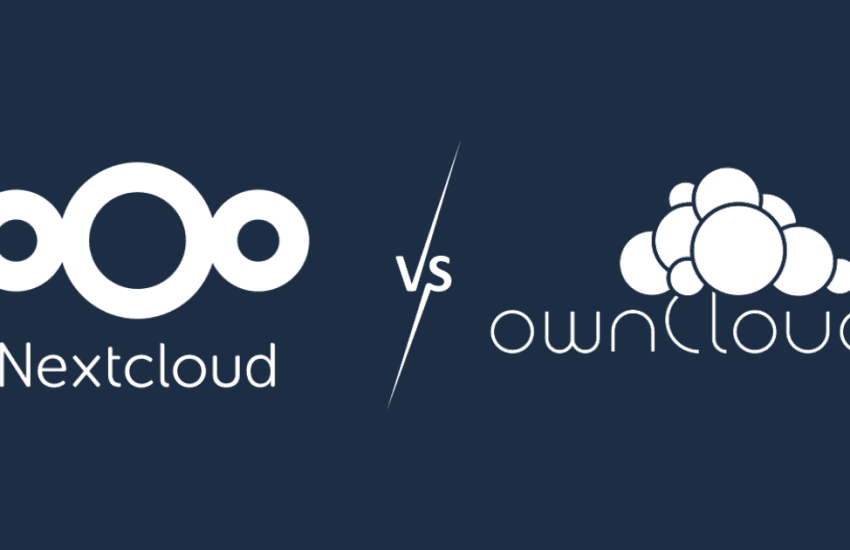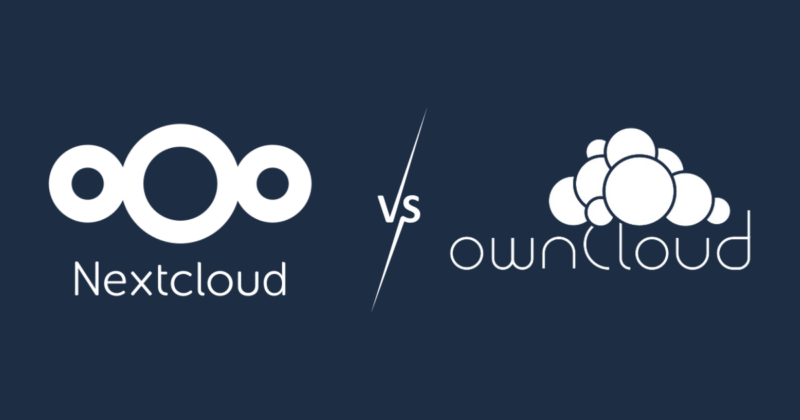Netxcloud and ownCloud are two open-source cloud storage solutions that give you the option to self-host them. While they started as file hosting services, both of them have evolved to offer various other services.
What’s interesting is that both the platforms share a common history — Nextcloud was forked from ownCloud in 2016. They have evolved independently ever since.
In this article, I’ll walk you through what these platforms are and their common features. Next, you’ll look at each of them individually – their offerings and advantages. You then see them side by side and the limitations they come with.
What’s Nextcloud and ownCloud?


When it comes to cloud storage and collaboration, we usually think of Google Workspace, Microsoft Teams, or Dropbox. Enterprises are also going for multi-cloud options. So, why need Nextcloud or ownCloud?
Well, the main highlight is the fact that you have the option to keep your data completely under your control. No more having to keep it at a shared central location. This protects you from data breaches that might happen when using a public hosting service.
But there’s more to it than just data security and privacy. Let’s take a look at the features they offer:
Sharing and collaboration
It’s not just about storing files. You can easily share your files and folders with others. Additionally, you can collaborate in real time.
File storage and syncing
You can securely store your files like documents, photos, music, and videos. You can easily have them synced across all your devices.
Access control
You can set permissions to manage who can access your data. There’s the option to grant permissions at different levels for both individual users as well as user groups.
Security
With both platforms, you get encryption for your stored data, and when you’re collaborating online. There are two-factor authentication and other security features to protect your data.
Other than the features, one of the best advantages of both solutions is that they are open-source. They are licensed under the GNU Affero General Public License version 3 (AGPLv3).
Now that you know more about what these platforms are and what they offer, it’s time to look at the platforms in detail.
What is Nextcloud?
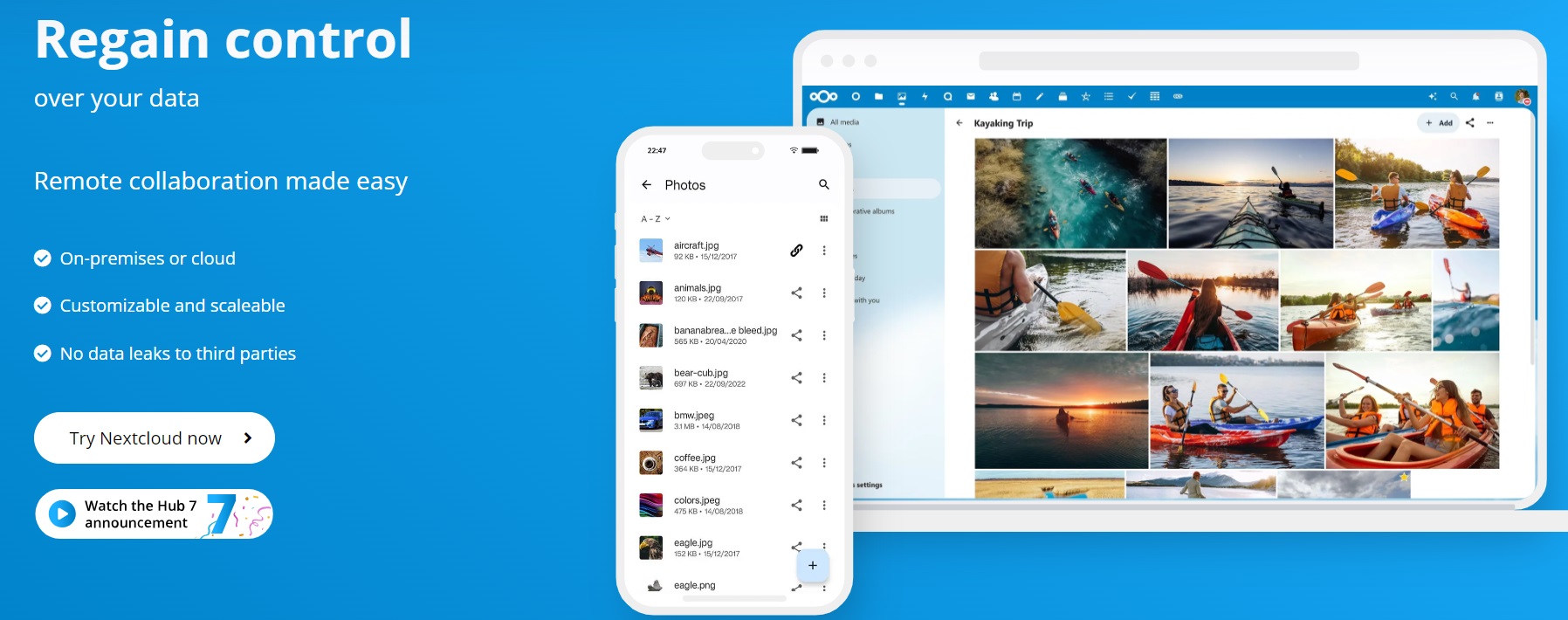

Nextcloud is an open-source, self-hosted content collaboration platform. It puts you in control of your data and privacy. By providing a secure and compliant solution for file storage, communication, and collaboration, Nextcloud makes it easy for you to set up your private cloud storage platform — be it for personal use or your enterprise.
Products Offered by Nextcloud
You get to select from multiple product offerings from Nextcloud. Whether it’s for file management, collaboration, or group communications, Nextcloud has it all.
#1. Nextcloud Files
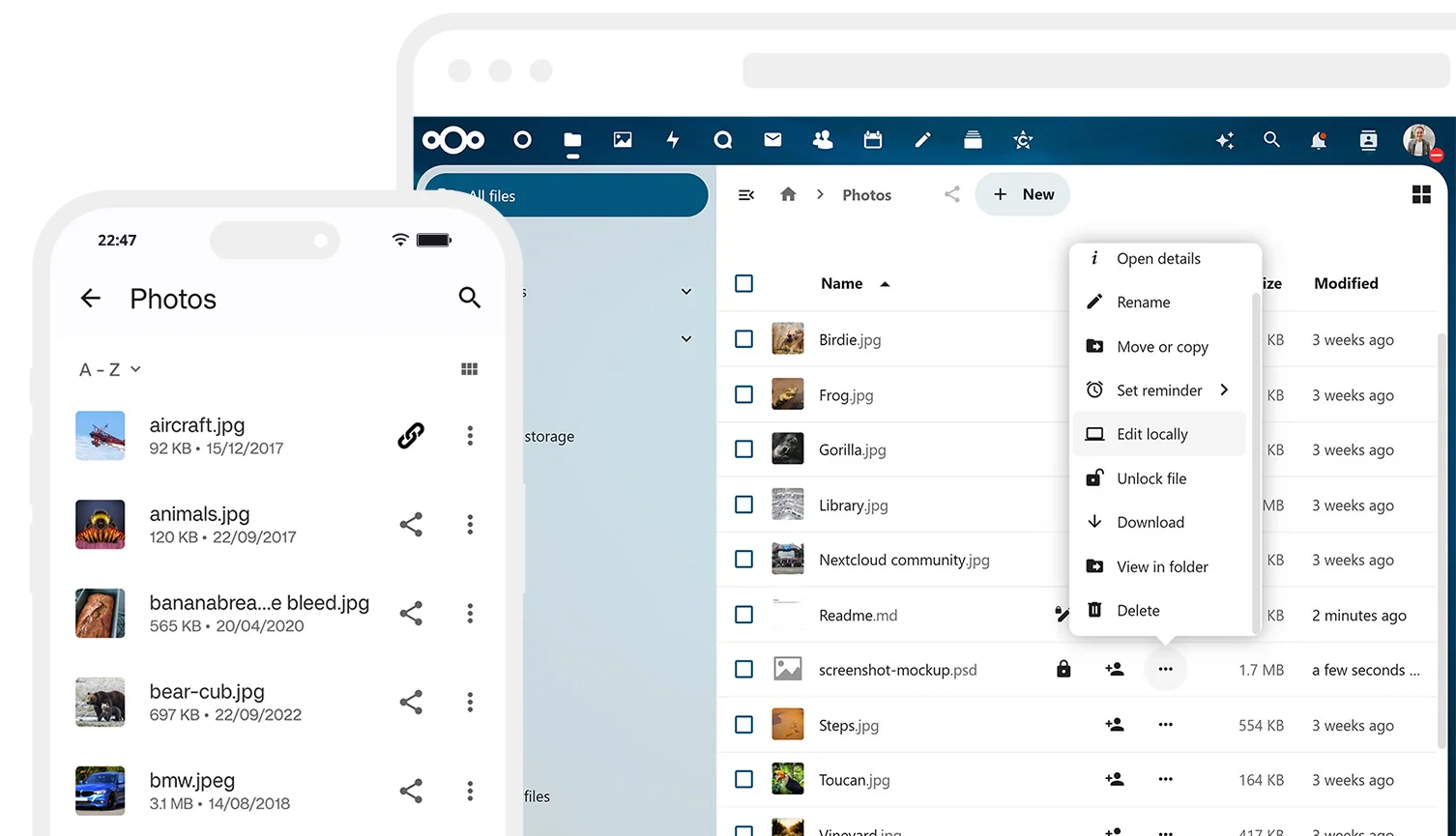

With Nextcloud Files, you can self-host your own file storage platform that has sync capabilities built in. You and your team can access and collaborate on these files from anywhere. Alongside an intuitive web interface, desktop clients, and mobile apps, there are powerful encryption and rule-based access control mechanisms.
#2. Nextcloud Talk


Nextcloud Talk offers private on-premise text, audio, and video chat capabilities. Your data remains on your servers at all times, ensuring no data leaks.
#3. Nextcloud Groupware
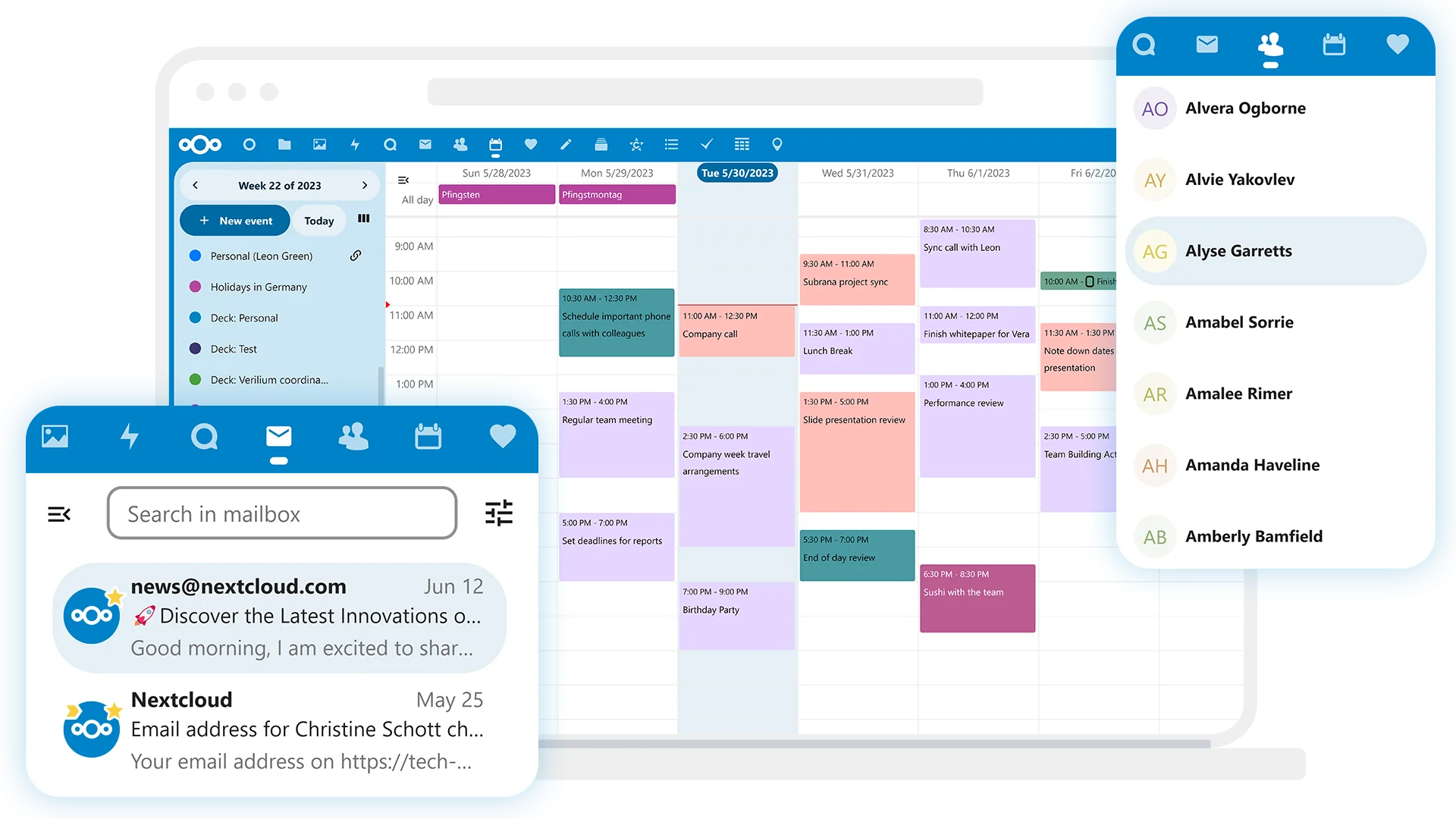

Looking to get your suite of self-hosted collaboration tools like calendars, contacts, and mail? Then Nextcloud Groupware is your answer. You can easily integrate it with Nextcloud Files and help your team get their work done easier and quicker.
#4. Nextcloud Office
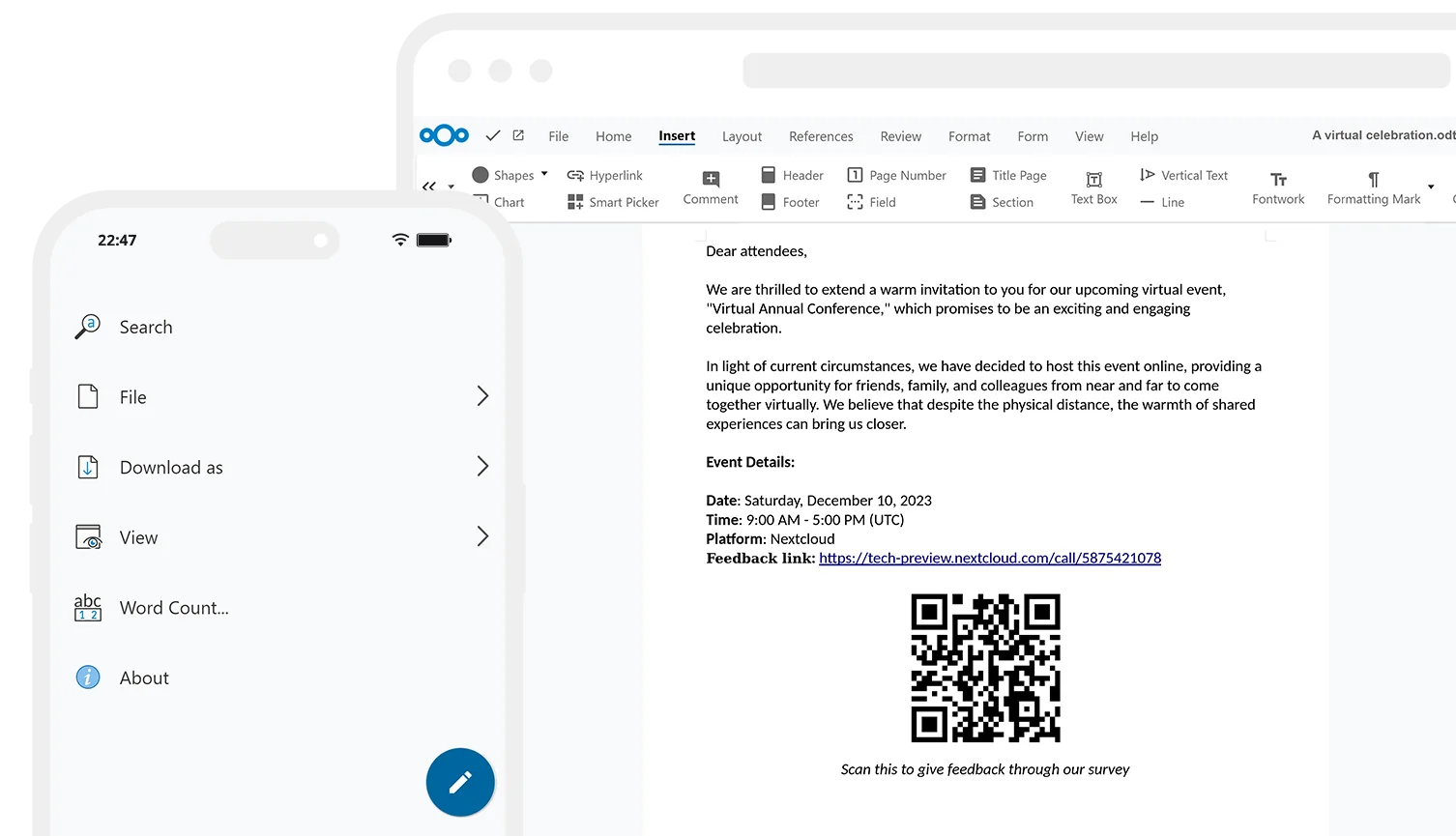

Nextcloud Office is a LibreOffice-based, powerful online office suite. It supports all major document, spreadsheet, and presentation formats.
#5. Nextcloud Hub
If you’re looking to get all the products mentioned above, then you might as well get all of them packaged as one — with Nextcloud Hub. By having a single solution that integrates everything you might need, you eliminate the need for manually managing different SaaS products.
Pros of Nextcloud
Privacy and Security
With Nextcloud running on your server, you don’t have to rely on cloud storage providers who store data on remote servers. This gives you complete control over your data. Encrypt your data when it’s at rest or when communicating online.
Add to the fact that Nextcloud is entirely open-source, you can run your independent security audits for utmost transparency.
Customizations
You get to choose from a wide range of apps and plugins that meet your specific needs. Be it file sharing, or video conferencing, you can customize however you want. The platform offers capabilities to develop your custom apps and integrations as well.
Real-Time Collaboration
Nextcloud allows you and your team to collaborate on files in real-time. This improves productivity.
Communication Tools
To aid your real-time collaboration, Nextcloud Talk enables audio, video, and text-based communication channels. Along with integrated management tools like calendars and emails, you can stay organized and coordinate your projects effectively.
User-Friendly
Nextcloud has a user-friendly and intuitive interface. This makes it easy to learn and use for everyone. You can access your cloud storage and communication tools from anywhere — via the web interface, mobile apps, or the desktop client.
Cost-Effective
When you compare self-hosting to commercial cloud storage platforms, the former tends to be cheaper. While there is an initial setup cost, you no longer have to maintain a recurring payment. Being open-source, you also eliminate the license cost.
Cons of Nextcloud
While Nextcloud offers you great features, and you can use all of them for free if you self-host, there are some limitations that you should be aware of.
- Nextcloud is sometimes known to have issues with high resource demands, particularly when handling a lot of users or operating on hardware with limited resources.
- When you are self-hosting Nextcloud on your own server, configuring it may pose a challenge for you.
- Certain Nextcloud features and functionalities rely heavily on additional apps. This increases your setup complexity and requires maintenance for updates and compatibility.
- While you do get file-sharing and collaboration tools, its collaborative features may not match what other cloud solutions have to offer.
- There have been reported security vulnerabilities in the past. You should also be vigilant when it comes to Nextcloud security concerns.
What is ownCloud?
ownCloud is an open-source file-sharing platform that syncs and shares your files, along with providing a variety of products and features — be it for your individual use or your business.
While it shares the same open-source license as Nextcloud, ownCloud does have an enterprise version with added features that aren’t open-source.
Products Offered by ownCloud
ownCloud offers three main products – ownCloud Infinite Scale, ownCloud 10, and ownCloud online. The latter is a SaaS offering that saves you from the burden of maintaining your own servers.
#1. ownCloud Infinite Scale
ownCloud Infinite Scale is the new and most secure version of ownCloud. It is designed as a cloud-native three-tier architecture. You get absolute control over your data and privacy, whether you’re running on your premises or cloud servers. It has guaranteed compliance with GDPR and WCAG/BITV standards. You get a file firewall, full-text search, secret file drop folders, and more.
#2. ownCloud 10
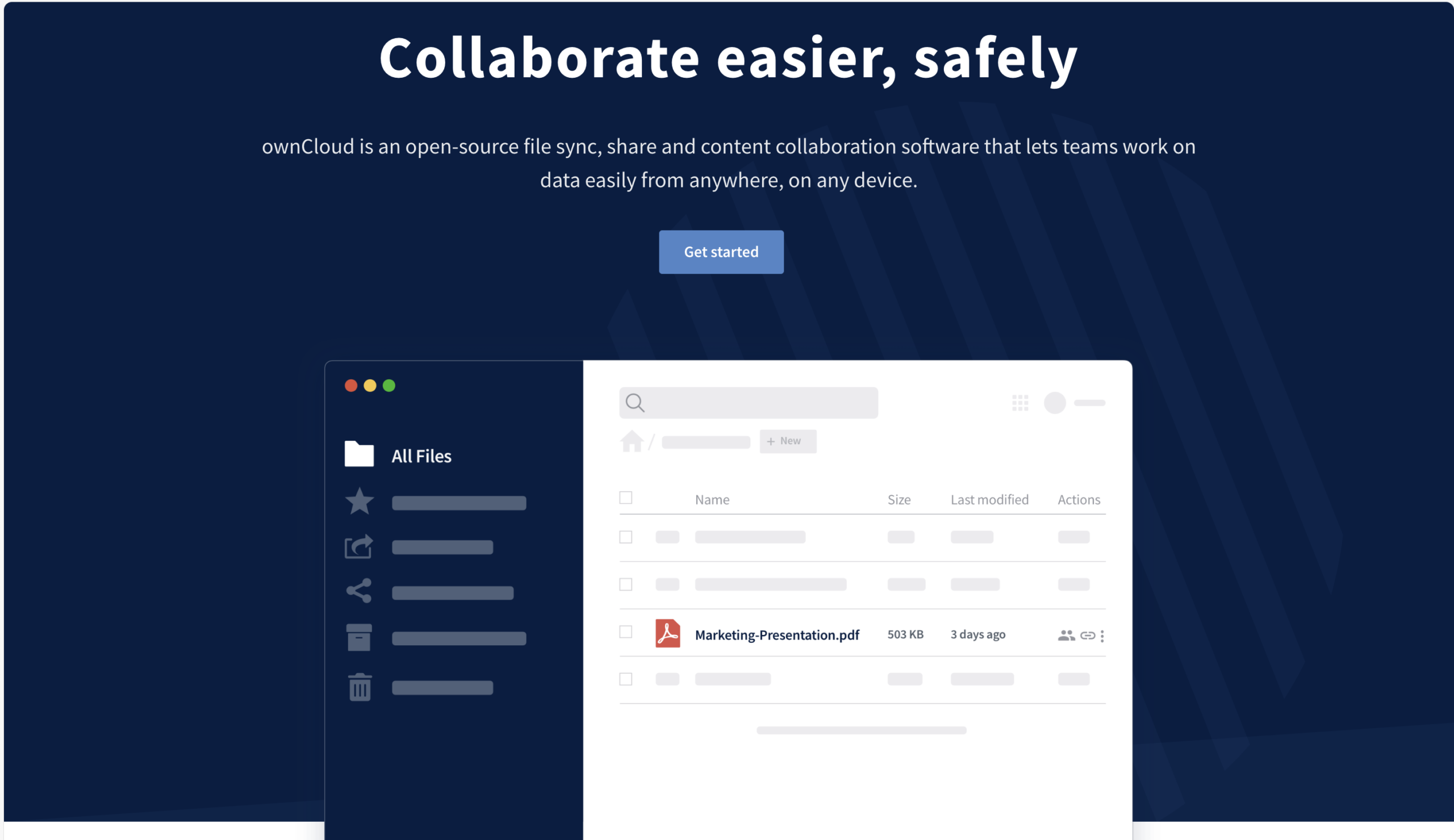



If you’re looking to self-host without any cost, ownCloud 10 is the open-source version of ownCloud that you can use to sync your files, share them, and collaborate with your team. You can access it using the web app, mobile apps for Android and iOS, or the desktop app. There’s support for external file sharing with guest users. You get multi-factor authentication and encryption that keeps your data secure.
#3. ownCloud online
ownCloud online is the SaaS offering from ownCloud. If you don’t want to maintain and manage your own servers or cloud provider but want to use ownCloud, then ownCloud online is the choice. With their servers in Germany, you get end-to-end encryption along with 100% GDPR compliance. You can customize it with your brand identity for a more professional digital experience.
Pros of ownCloud
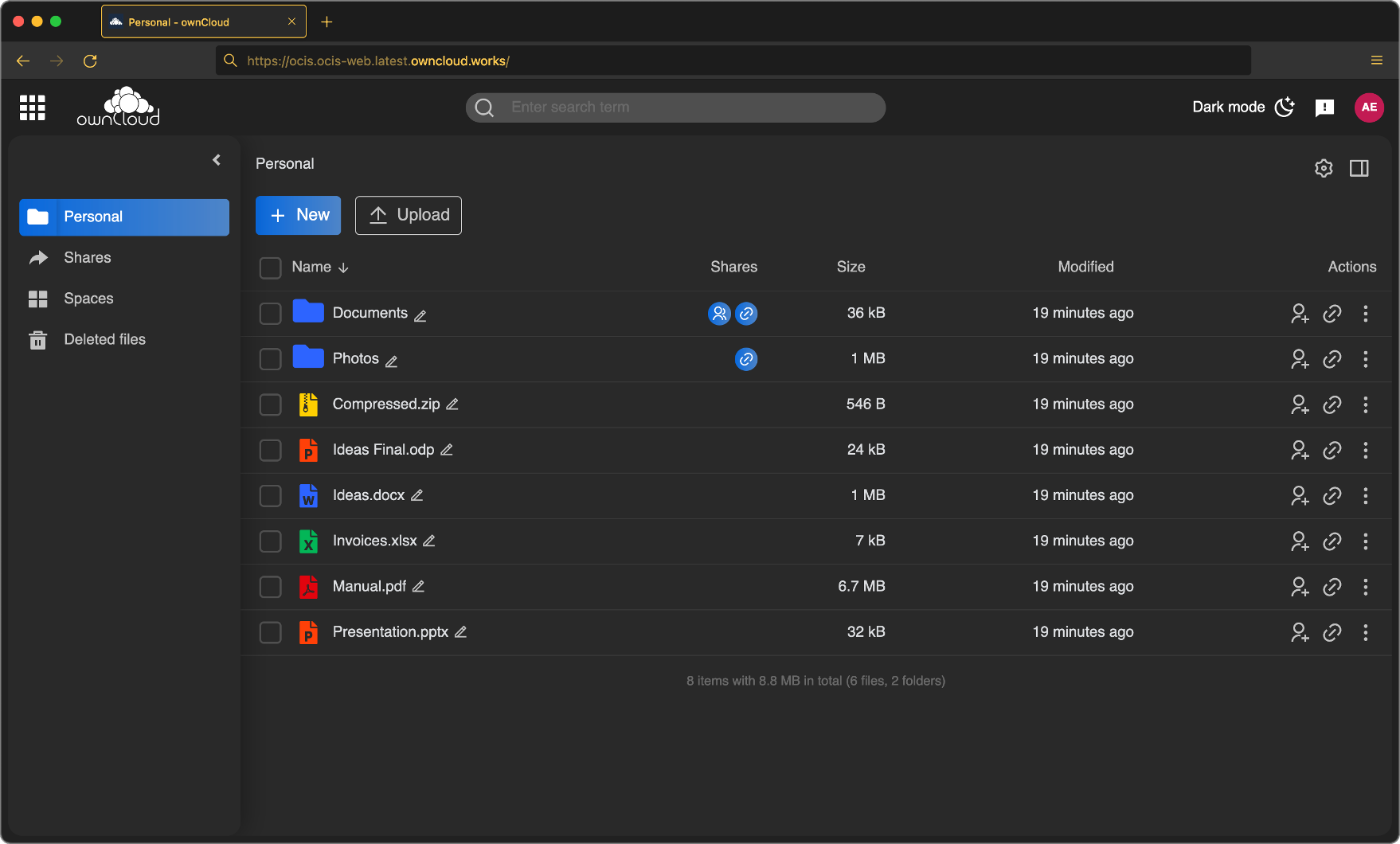



Scalability
As a cloud-native solution, ownCloud adapts to your needs. Whether you choose to host it on your servers or go for the SaaS solution, you can handle large data volumes and user bases with ease.
Security
Features like end-to-end encryption and multi-factor authentication ensure that your data is always protected. Additionally, you also get intrusion detection. You have granular settings for access control.
Real-Time Awareness
With the ownCloud activity stream, you can track your file changes and comments instantly. Now, you no longer have to manually check for updates. You can set up your notifications based on your requirements and be notified.
Integrations
You can integrate ownCloud with your existing workflow. This eliminates the learning curve that your team might have to face with new software. You can access, edit, and share files directly within ownCloud with the integrations with Microsoft Office, LibreOffice, and your other productivity tools.
Expanded Storage
ownCloud lets you connect to external storage providers like Amazon S3 or Google Drive. By doing so, you gain flexibility with scaling and can access your existing documents.
Cons of ownCloud
Like Nextcloud, ownCloud also offers you a great set of features. However, just like with any technology solution, you must be aware of the limitations.
- One of the biggest limitations is the fact that not all features are present in the standard edition.
- Certain features are only available for paid enterprise users.
- If you’re going for the standard edition, then the quality of the documentation might seem lacking.
- Bug fixes and general updates aren’t pushed that frequently.
- ownCloud’s community also seems to be less active, with a lot of issues present on the open-source.
Nextcloud vs. ownCloud: Differences
It’s time to compare the two solutions side-by-side.
| Nextcloud | ownCloud | |
|---|---|---|
| Storage | There is no limit on storage for the self-hosted solution. | No limit on storage for the self-hosted solution. |
| Access Control | Set permissions for individual files and folders. Control download and upload rights. | Group-based access is only available in the paid Enterprise edition. |
| File Sharing | Has individual products for file and collaborations. | Has file sharing as a core feature. |
| Security | All security features are accessible for free, including protection against brute force attacks and flow restrictions. | Some features, like E2EE, are restricted to enterprise users. |
| License | Both community and enterprise editions come under the AGPLv3 license. | The standard edition has the AGPLv3 license. Enterprise edition has a commercial license. |
| Additional Features | All features are available. | Some features are available only in the enterprise edition. |
| App integrations | Wide range of apps available. | Lesser number of apps compared to Nextcloud. |
Choose the One That’s Best for You
Being a senior software engineer, I am someone who prefers trying out various tech. I’ve tried both platforms for my private self-hosted cloud storage setup – both of them come with their own set of features.
The main highlight is that both of them have open-source versions. You must take care of the fact that the entirety of Nextcloud is open-source, while ownCloud enterprise has features that have a commercial license. You can easily set up both in your servers and use them to store, manage, and collaborate on your files. Their UI is quite similar.
When it comes to bug fixes and release updates, the Nextcloud project is updated more frequently when compared to ownCloud. Nextcloud also has better documentation and an online active community.
But if you’re looking for an enterprise-only solution with added features, then ownCloud can be a great option. The SaaS offering lets you run your private cloud storage solution for your organization without having to maintain the servers.
The choice ultimately should be based on your use case. If you’d prefer user-friendliness and community support for your own personal cloud, then go for Nextcloud. On the other hand, if you’re looking for a cloud storage solution for your enterprise, then ownCloud might be a better option. Whichever solution you pick, you can be certain that both of them are excellent in what they offer.
Si quiere puede hacernos una donación por el trabajo que hacemos, lo apreciaremos mucho.
Direcciones de Billetera:
- BTC: 14xsuQRtT3Abek4zgDWZxJXs9VRdwxyPUS
- USDT: TQmV9FyrcpeaZMro3M1yeEHnNjv7xKZDNe
- BNB: 0x2fdb9034507b6d505d351a6f59d877040d0edb0f
- DOGE: D5SZesmFQGYVkE5trYYLF8hNPBgXgYcmrx
También puede seguirnos en nuestras Redes sociales para mantenerse al tanto de los últimos post de la web:
- Telegram
Disclaimer: En Cryptoshitcompra.com no nos hacemos responsables de ninguna inversión de ningún visitante, nosotros simplemente damos información sobre Tokens, juegos NFT y criptomonedas, no recomendamos inversiones

